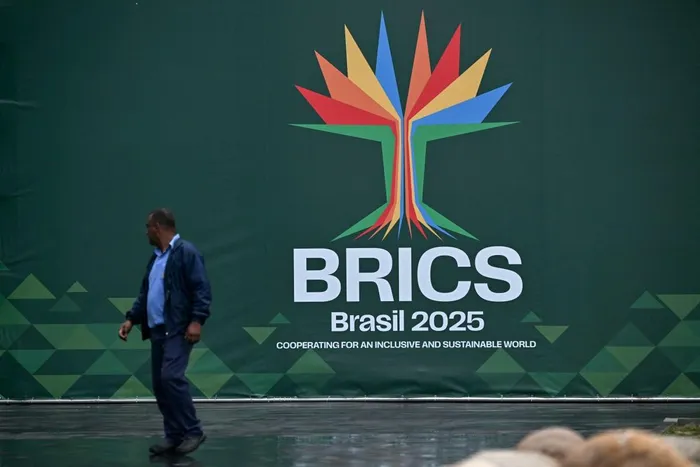Rand weakens as Trump extends tariffs on emerging economies, escalating trade tensions
MARKETS

Trump also reiterated previous warnings of imposing tariffs of up to 100% on BRICS nations should they abandon the US dollar in bilateral trade, and further warned other countries against joining the alliance.
Image: Mauro PIMENTEL/AFP
The rand weakened to its lowest in nearly two weeks against the major currencies on Monday as global risk was seen to have escalated following US President Donald Trump’s tariff threat.
On Sunday, Trump announced an extension to the tariff deadline, pushing it to the beginning of August while imposing an additional 10% tariff with “no exceptions” on countries aligning with the policies of BRICS—a bloc of emerging economies comprising Brazil, Russia, India, China, and South Africa.
Trump also reiterated previous warnings of imposing tariffs of up to 100% on BRICS nations should they abandon the US dollar in bilateral trade, and further warned other countries against joining the alliance.
The expanded BRICS bloc now encompasses 11 countries, representing 43% of the global population, 32% of the world's land area, and approximately 35% of global GDP, which makes these tariffs even more impactful.
On Monday, BRICS currencies, along with emerging markets, came under pressure.
The rand weakened by 1.15% to R17.79 against the US dollar, 0.9% to R20.90 against the euro, and 0.9% to R24.20 against the British pound, marking its lowest level since June 27.
According to Investec's chief economist, Annabel Bishop, the rand's decline was attributed to rising uncertainty surrounding global trade.
She stated that after briefly nearing the key resistance level of R17.50 against the US dollar last week due to the dollar's weakness, the renewed tariff threats compelled a rebound of the dollar, thereby pulling the rand lower.
“The ongoing uncertainties around global trade, with high levels of protectionism (including tariffs) negatively impacting globalisation and global growth, has caused some market concerns, seeing US dollar strength on some safe-haven purchases,” Bishop said.
“The additional 10% BRICS tariffs would add further drag to SA’s export competitiveness, and this has added to rand weakness, with the universal extension to early August not currently expected to see SA return to prior Agoa status.”
The impact of the tariffs is expected to weigh heavily on South Africa's export competitiveness.
The rand's further depreciation comes despite prior efforts by South Africa to negotiate better terms with the Trump administration over trade relations.
In fact, the country had already faced a 10% tariff along with an additional 30% duty on certain imports prior to a temporary pause for negotiations.
Trade, Industry and Competition Minister, Parks Tau, recently said there was still room for engagement with the US regarding trade protectionism.
South Africa has submitted a draft Framework Agreement to address American concerns over non-tariff barriers, as well as trade deficits, but has yet to receive a response. This Framework aims to resolve long-standing access issues while promoting investments on both sides.
Nigel Green, CEO of global financial advisory deVere Group, said Trump’s fresh threat to slap an additional 10% tariff on any country backing the BRICS alliance was accelerating a decisive shift among global investors — one that’s moving capital, attention and confidence away from the US.
“Tariffs were once a bargaining tool. Now they’re a permanent threat. That changes how markets view American reliability. We’re seeing a structural reassessment of US exposure,” Green said.
“The message from BRICS is to build around the US, not with it. That’s a direct consequence of Trump’s strategy, and it’s setting the stage for a less US-centric world economy.”
Meanwhile, the BRICS Leaders Declaration on Sunday said the multilateral trading system has long been at a crossroads.
It said the proliferation of trade-restrictive actions, whether in the form of indiscriminate rising of tariffs and non-tariff measures, or protectionism under the guise of environmental objectives, threatened to further reduce global trade, disrupt global supply chains, and introduce uncertainty into international economic and trade activities, potentially exacerbating existing economic disparities and affecting prospects for global economic development.
“We voice serious concerns about the rise of unilateral tariff and non-tariff measures which distort trade and are inconsistent with World Trade Organisation rules (WTO),” read the Declaration.
“In this context, we reiterate our support for the rules-based, open, transparent, fair, inclusive, equitable, non-discriminatory, consensus-based multilateral trading system with the WTO at its core, with special and differential treatment for its developing members.”
BUSINESS REPORT